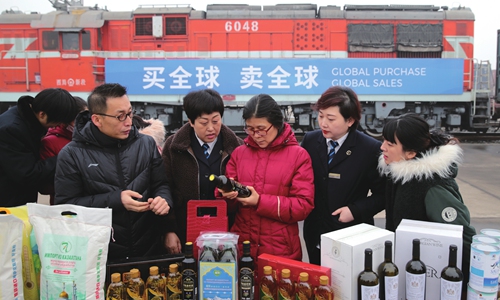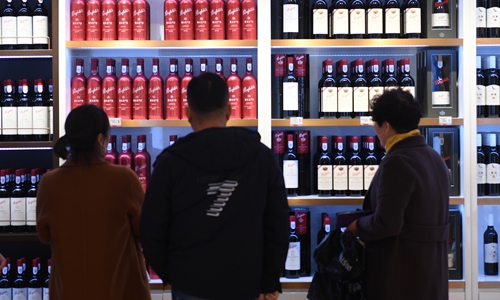Imported products favored
Lunar New Year spree boosts domestic, global economy

Customers shop for goods including flour, edible oil and wine at an open air market in Xinzhu train station in Xi'an, Northwest China's Shaanxi Province on Thursday. The China-EU freight train brings local residents more choices of goods for the upcoming Spring Festival, which falls on January 25. Among 8,225 such transcontinental trains in 2019, 2,133 departed from or arrived at Xi'an. Photo: cnsphoto
Chilean cherries, Spanish wine, North American lobster… The world's largest market is open and welcoming exotic products from faraway lands during a Spring Festival shopping spree that will boost not only domestic economic growth but also that of the wider world.With the development of e-commerce and cross-border logistics, a more diverse range of products from across the globe are being enjoyed by Chinese consumers during the festival season, also known as the Spring Festival or the Chinese New Year.
Ahead of the annual family reunion, Chinese people are accustomed to buying daily necessities, food and drink in local markets with fewer choices.
"I'm considering buying Spanish wine on online shopping platforms like Tmall for the holidays, which will cost about 200 yuan ($29.2) a bottle," said a Beijing-based white-collar worker surnamed Zhang.
"It's not expensive but very convenient," Zhang told the Global Times on Sunday.
On Thursday, a train from Toshkent, capital of Uzbekistan, arrived in Xi'an, capital of Northwest China's Shaanxi Province, bringing flour, cooking oil, fresh seafood and healthcare products to tickle the holiday shopping fancy of city residents.
Other Chinese cities have experienced a rapid growth in imported goods in recent years and as Europe-China train services surge ahead of the festival.
In 2019, 42,286 twenty-foot equivalent units (TEUs) containers were shipped by train from Madrid to Yiwu, a major wholesale market in East China's Zhejiang Province, a 68.7 percent year-on-year increase, the operator said in a document sent to the Global Times on Sunday.
As the festival season approaches, more trains have been shipping products like Spanish wine and Russian cooking oil from Europe to China, the operator said.
In December 2019, 7,978 TEUs were shipped, up 304 percent year-on-year, the document showed.
The holiday shopping spree can be interpreted as a test of the country's economic resilience and potential, Chinese experts noted on Sunday.
China has vowed to expand imports by lowering tariffs, they noted, making imported products more familiar and accessible to Chinese consumers.
Foreign imports
China has "vast room for market growth with strengthened growth momentum," Sheng Laiyun, deputy head of the National Bureau of Statistics, was quoted as saying in media reports.
With an expanding middle class and per capita GDP hitting $10,000, China's domestic consumption will upgrade, unleashing more potential and driving up demand for imports, the reports said.
"This year's Spring Festival consumption will be positive, featuring more new consumption trends," Liu Jianying, an associate research fellow at the Chinese Academy of International Trade and Economic Cooperation in Beijing, told the Global Times on Sunday.
"Without going abroad, Chinese consumers now can enjoy better access to foreign products, and consumption potential is expected to further unleashed," she said.

Customers choose imported wine at a duty-free store in Hangzhou, capital of East China's Zhejiang Province on Saturday. The store - which is holding trial operations - is the first duty-free store in the city. The State Council, China's cabinet, announced plans to lower or remove import tariffs on more than 850 items starting from January 1. Photo: cnsphoto
Consumption economy
Domestic research firm iiMedia forecast in a report released on January 12 that holiday consumption would reach over 1.1 trillion yuan ($160.4 billion) this year, while more innovative spending on online platforms would attract Chinese millennials.
China has been seeking to shift from an investment-driven to a domestic consumption-powered economy in recent years.
To meet the upgrade, China from January 1 lowered or canceled import duties on products including frozen pork, imported fruit and juice as well as pharmaceutical products.
In fulfilling its promises of further opening to the global market, China has also posted stronger foreign trade growth in 2019 by expanding 3.4 percent year-on-year, according to official data.